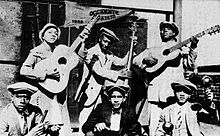music.wikisort.org - Poet
Ignacio Piñeiro Martínez (May 21, 1888 – March 12, 1969) was a Cuban musician, bandleader and composer whose career started in rumba and flowered in the rise of the son. He was one of the most important composers of son music; in total he wrote about 327 numbers, mostly sones.[1]
Ignacio Piñeiro | |
|---|---|
 Sexteto Occidente, New York, 1926. Piñeiro is standing in the center. | |
| Background information | |
| Birth name | Ignacio Piñeiro Martínez |
| Born | May 21, 1888 Havana, Cuba |
| Died | March 12, 1969 (aged 80) Havana, Cuba |
| Genres | Cuban rumba, guaguancó, son cubano, afro, guajira, guaracha |
| Occupation(s) | Musician, bandleader, songwriter |
| Instrument(s) | Double bass |
| Years active | 1903-1969 |
| Labels | Columbia |
Piñeiro was a brilliant rumbero who worked with musical groups from 1903 onwards. In 1906, was a member of the Timbre de Oro coro de clave y guaguancó (a vocal group precursor of contemporary guaguancó), and later directed Los Roncos, another famous coro de guaguancó. He was taught the double bass by María Teresa Vera, and in 1926 he was a member of her band, Sexteto Occidente, which recorded in New York City. In 1927 he founded the Sexteto Nacional de Ignacio Piñeiro, later simply known as Sexteto Nacional, in which he was the director and songwriter. With the addition of a trumpet the band became the Septeto Nacional.
For financial reasons, Piñeiro quit the group in 1935; it was then led by trumpet player Lázaro Herrera until the group disbanded in 1937. Piñeiro became for some years the leader and principal songwriter of Los Roncos.[2] The Septeto Nacional was recreated several times from 1954 onwards, initially under Piñeiro's direction, and it continues to perform.[3]
Piñeiro's composition "Échale salsita" (written on a train to Chicago in 1930, and the first song use of the world "salsa" in son) influenced George Gershwin's Cuban Overture. The two met when Gershwin visited Cuba in February 1932.[4] Many of Piñeiro's songs have been performed by other artists like Ray Barretto ("Don Lengua") and René Álvarez ("A la lae la la"). In 1999, Piñeiro was posthumously inducted into the International Latin Music Hall of Fame.[5]
Compositions
- "Dónde estabas anoche" (1925)
- "Asturias, patria querida" (lyrics, 1926)
- "Don Lengua"
- "A la lae la la"
- ”Esas no son cubanas"
- "Mentira"
- "Bardo"
- "Mayeya, no jueges con los santos"
- "Las cuatro palomas"
- "Noche de conga"
- "Coco mai mai"
- "Suavecito" (1929)[6]
- "Échale salsita" (1930)
- "Lindo yambú"
- "Guaguancó callejero"
- "Lejana campiña"
- "Buey viejo"
- "Llegó la tora"
References
- Giro, Radamés (2007). Diccionario enciclopédico de la música en Cuba, Vol. 3. Havana, Cuba: Letras Cubanas. p. 236.
- Orovio, Helio (2004). Cuban Music from A to Z. Bath, UK: Tumi. pp. 147, 165.
- Harris, Craig. "Ignacio Piñeiro - Biography". AllMusic. Rovi. Retrieved October 6, 2015.
- "George Gershwin and his Cuban overture". Cubasi.com.
- de Fontenay, Sounni (7 December 1998). "International Latin Music Hall of Fame". Latin American Rhythm Magazine. Retrieved 18 October 2014.
- Sublette, Ned (2004). Cuba and its Music: From the First Drums to the Mambo. Chicago, IL: Chicago Review Press. p. 362.
На других языках
- [en] Ignacio Piñeiro
[es] Ignacio Piñeiro
Ignacio Piñeiro Martínez (La Habana, 21 de mayo de 1888 - La Habana, 12 de marzo de 1969) fue un músico cubano, fundador de la orquesta Septeto Nacional. Está considerado uno de los más importantes exponentes del son cubano y sus variantes.Другой контент может иметь иную лицензию. Перед использованием материалов сайта WikiSort.org внимательно изучите правила лицензирования конкретных элементов наполнения сайта.
WikiSort.org - проект по пересортировке и дополнению контента Википедии